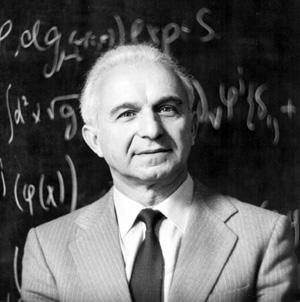|
CERN COURIER, Volume 39, Number 7, September 1999

After 50 years of creatived activity at the forefront of theoretical
physics, Efim Fradkin died in Moscow on 25 May. His research extended
from pioneering the functional method in quantum field theory and
discovering, simultaneously with Schwinger, its Euclidean formulation,
to basic work in string theory.
He was born in a Jewish neighbourhood near Minsk. At 16 he the university
there for a year. The famous mathematician I M Gel'fand, who occasionally
lectured there, recognized Fradkin's outstanding abilities and, to support
him, gave him 100 roubles. However, the war intervened and Fradkin's family
were killed. He joined the army and was wounded in the Battle of Stalingrad.
Fradkin appeared in Moscow in 1948 and was adopted by I E Tamm and
V L Ginzburg at the Theoretical Department of the Lebedev Physics Institute,
which became his home for the remaining 50 years of his scientific life.
"In the theatre of operations known as theoretical physics, Efim's attacks
have been launched along the whole front", wrote Bryce DeWitt in Fradkin's
festschrift. Fradkin pioneered conformal field theory and contributed to the
theory of turbulent mixing. He developed the Batalin-Fradkin-Vilkovisky
method for quantizing for general constrained systems, found new ways to
solve spin lattice models, tackled the problem of grand unification via
exceptional groups and studied transfer processes in plasma.
Fradkin introduced the method of Green's functions in relativistic
statistics and discovered, alongside Landau and Pomeranchuk, the zero-charge
behaviour of QED (better known in the West as the Landau pole). He discovered
open algebras and invented the first example of gauge supergravity. His
relativic eikonal approximation and the Efimov-Fradkin non-perturbative
calculus gave birth to whole new trends of research.
Fradkin was awarded the Stalin state prize in 1953, the I.E.Tamm prize
in 1980 and the Dirac medal in 1989 and was the first recipient of the
Sakharov medal in 1996. He was a foreign member of Accademia Pontaniana in
Naples and a full member of the Academy of Sciences of Russia. He was a
member of CERN's Theory Division, as guest professor of the
director-general, in 1996/7.
Fradkin acted as a magnet for young theorists. When his coffin was exposed
at the Lebedev Institute, two generations of disciples kept quard.
For them - and for the whole community of theoretical physics - his passing
was a tremendous loss.
|